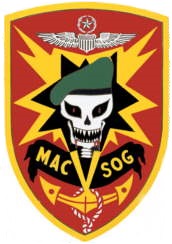
Military Assistance Command, Vietnam – Studies and Observations Group
Military Assistance Command, Vietnam – Studies and Observations Group (MACV-SOG) was a highly classified, multi-service United States special operations unit which conducted covert unconventional warfare operations before and during the Vietnam War.
Military Assistance Command, Vietnam – Studies and Observations Group (MACV-SOG)
24 January 1964 – 1 May 1972
Joint unconventional warfare task force
Strategic reconnaissance, covert action, psychological warfare
Brigade +
Saigon (HQ)
Detachments:
- Command & Control North (CCN) Quảng Trị/Phu Bai Combat Base
- Command & Control Central (CCC) Kontum
- Command & Control South (CCS) Ban Me Thuot
SOG, MACSOG
Established on 24 January 1964, it conducted strategic reconnaissance missions in the Republic of Vietnam (South Vietnam), the Democratic Republic of Vietnam (North Vietnam), Laos, and Cambodia; took enemy prisoners, rescued downed pilots, conducted rescue operations to retrieve prisoners of war throughout Southeast Asia, and conducted clandestine agent team activities and psychological operations.
The unit participated in most of the significant campaigns of the Vietnam War, including the Gulf of Tonkin incident which precipitated increased American involvement, Operation Steel Tiger, Operation Tiger Hound, the Tet Offensive, Operation Commando Hunt, the Cambodian Campaign, Operation Lam Son 719, and the Easter Offensive. The unit was downsized and renamed Strategic Technical Directorate Assistance Team 158 on 1 May 1972, to support the transfer of its work to the Strategic Technical Directorate of the Army of the Republic of Vietnam as part of the Vietnamization effort.
The U.S. military (and MACV-SOG personnel) kept tight security over knowledge of the unit's operations and existence until the early 1980s. Although there had been some small leaks by the media during the conflict, they were usually erroneous and easily dismissed.[57] More specific was the release of documents dealing with the early days of the operation in the Pentagon Papers and by the testimony of ex-SOG personnel during congressional investigations into the bombing campaigns in Laos and Cambodia in the early 1970s.[58] Historians interested in the unit's activities had to wait until the early 1990s, when MACV-SOG's Annexes to the annual MACV Command Histories and a Pentagon documentation study of the organization were declassified for the Senate Select Committee on POW/MIA Affairs' hearings on the Vietnam War POW/MIA issue.[59]
One early source of information (if one read between the lines) were the citations issued for the award of the Medal of Honor to MACV-SOG personnel (although they were never recognized as such).[60] One USAF helicopter pilot, two U.S. Navy SEALs, one U.S. Army medic, and nine Green Berets earned the nation's highest award on SOG operations:
Twenty-two other members of the unit received the Distinguished Service Cross, the nation's second highest award for valor. On 4 April 2001, the U.S. Army officially recognized the bravery, integrity, and devotion to duty of its covert warriors by awarding the unit a Presidential Unit Citation during a ceremony at Fort Bragg, North Carolina, the home of U.S. Army Special Forces.
Unpublished government documents
Published government documents
Memoirs and autobiographies
Secondary sources